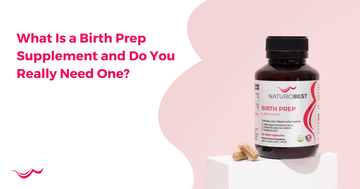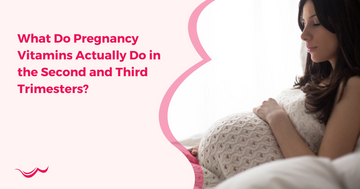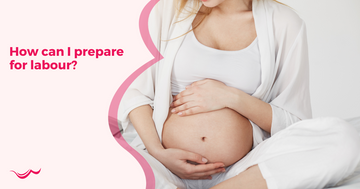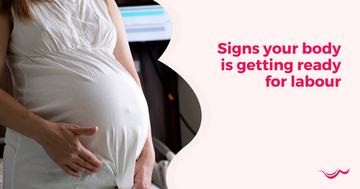How To Choose The Best Prenatal Vitamin
by Nikki Warren on May 04, 2022

With so many prenatal vitamin supplements on the market, how on earth is a health-conscious mama supposed to choose the best one for her and her bub?
What is a prenatal vitamin?
Firstly, we should clarify the meaning of the word "prenatal". A lot of people confuse this for meaning prior to conception, however prenatal refers to pregnancy. So a prenatal vitamin is another name for a pregnancy vitamin.
Preconception
The foundation for a healthy conception and pregnancy is for both partners to follow a preconception care plan. A preconception plan includes eating a healthy (preferably organic) diet, leading a healthy lifestyle and getting to know your cycle.
Pregnancy
A prenatal vitamin is not meant to replace a healthy diet. It helps ensure your daily nutritional requirements are being met. This can be especially difficult when suffering from morning sickness. Let’s take a look at the most important nutrients and how to become supplement savvy according to your trimester:
Folate
Folate is probably the most widely known nutrient associated with a healthy pregnancy. The neural tube closes at 6 weeks gestation. Folate supply should be optimal before this happens to help prevent neural tube defects.
Most women only find out they’re pregnant between 4-6 weeks. This is why it’s a good idea to take a preconception multi-vitamin prior to trying to conceive. There are 4 different types of folate:
- Folate found in food such as green leafy veggies
- Folic acid, a synthetic form only found in supplements
- Folinic acid, a type of activated folate found in food and supplements
- Active folate, otherwise known as 5-methyltetrahydrofolate (5-MTHF).
Active folate comes in two forms – bound to a calcium salt (levomefolate calcium) or a glucosamine salt (levomefolate glucosamine), otherwise known as Quatrefolic®.
Vitamin B12
If you are vegetarian or vegan you may struggle to get enough of this nutrient from your diet. Vitamin B12 helps support energy levels and is also involved in DNA synthesis. In other words, it may be just as important as folate in the prevention of neural tube defects. There are 4 different types of B12:
- Hydroxocobalamin is the type found in food and is also found in B12 injections (from your doctor) and supplements.
- A cheap form found in supplements is cyanocobalamin.
- The two active forms found in supplements are methylcobalamin and adenosylcobalamin. Hydroxocobalamin converts into the two active forms.
Naturopaths like to prescribe folate and B12 in a 1:1 ratio.
Vitamin B6
Several studies have found a reduction in morning sickness when taking 75mg of vitamin B6 daily. In the studies, they took either 25mg three times daily or 37.5mg twice daily. This is because B6 is a water-soluble vitamin and you will pee it out within a few hours, hence needing to top up throughout the day.
Choline
This important nutrient is required in huge amounts during pregnancy. The RDI is 440mg daily! Choline is a precursor to the neurotransmitter acetylcholine which is important for memory.
Eggs are a great source of choline with 126mg per egg. Of course, you probably won’t be eating eggs every day. It is likely your diet will fall short of the 440mg needed daily.
Vitamin C
If you are eating plenty of fresh fruit and veggies, this vitamin should be in abundance in your diet. It does assist with iron absorption so it is an important pregnancy vitamin. You can have too much of a good thing though.
High doses of vitamin C are known to act as a mild laxative. That can have harmful consequences during pregnancy. Although you may take vitamin C supplements when you have a cold, don’t take more than 2000mg in a day.
Iodine
In Australia, the public health recommendation is for pregnant women to take a daily supplement containing 150mcg of iodine. The recommended daily intake is 220mcg daily in pregnancy and 270mcg during breastfeeding. Iodine is required for healthy thyroid function and baby’s brain development. Good sources of iodine are fish, iodised salt (or Himalayan crystal salt) and eggs.
Iron
This mineral is in high demand in the last half of pregnancy due to a doubling in blood volume. In the first trimester, however, taking an iron supplement may aggravate the symptoms of nausea and vomiting. More so, if you are suffering from morning sickness.
It is a good idea to have your iron stores (ferritin) checked well before conception. So you have time to boost it to a high level. You could speak to your doctor about having an iron injection if your levels are particularly low.
This way, you don’t need to be too concerned about not taking an iron supplement in your first trimester. From the time your morning sickness subsides (usually around week 14-16). You can start taking a prenatal supplement containing a high-quality, low constipation iron such as iron bisglycinate. The RDI is 27mg daily, however, there is a legal limit on listed Australian complementary medicines of 24mg in a daily dose.
Calcium
This mineral is also in high demand, especially when baby’s bones are growing. If you eat dairy products, you may find it easier to meet your recommended daily dose of 1200mg daily during pregnancy.
If you need to take a supplement, take it separately from your prenatal vitamin. This is because calcium interferes with iron and zinc absorption. I like to tell my clients to take theirs at night. Calcium and magnesium are calming minerals, they usually enjoy a better night’s sleep!
Magnesium
This mineral is involved in over 300 enzyme reactions making it a pretty important mineral throughout all stages of life! Like any supplement, there are cheap forms that aren’t absorbed well. There are also high quality, well-absorbed forms like magnesium citrate and magnesium di-glycinate.
Just make sure you look at the “elemental” amount on a supplement label (sometimes labelled as “equivalent”). That is the true amount of magnesium that is in each capsule.
Copper
Copper helps to form blood cells but luckily it is easy to get the RDI of 1.3mg from your diet (naughty tip - it’s even found in chocolate!) Levels of copper rise naturally during pregnancy so there is usually no need to supplement.
Zinc
This is one of the most important minerals throughout the entire preconception, pregnancy and postnatal period. Zinc activates over 200 different enzymes in the body. Some people find high dose zinc supplements make them feel nauseous. The RDI of zinc is 11mg daily so you might want to stick to this dose during the first trimester when your tummy is a bit more sensitive.
Does your prenatal vitamin make you feel nauseous?
It might be the iron content in there or sometimes high dose zinc or B vitamins can make people feel queasy. Try switching to a formula specifically designed for the first trimester to reduce morning sickness. Always take your vitamins after a meal.
What to do if you have trouble swallowing it
Pregnant women often have a sensitive gag reflex. Anything as simple as brushing teeth or swallowing capsules can be difficult when you’re suffering morning sickness. Try opening the capsule and mixing with a bit of yoghurt or throw into a smoothie to disguise the taste.




